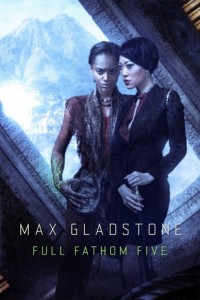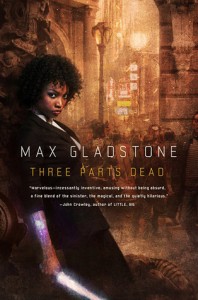 Format read: ebook provided by Edelweiss
Format read: ebook provided by EdelweissFormats available: ebook, hardcover, paperback
Genre: fantasy
Series: Craft Sequence, #3
Length: 384 pages
Publisher: Tor Books
Date Released: July 15, 2014
Purchasing Info: Author’s Website, Publisher’s Website, Goodreads, Amazon, Barnes & Noble, Kobo, Book Depository
On the island of Kavekana, Kai builds gods to order, then hands them to others to maintain. Her creations aren’t conscious and lack their own wills and voices, but they accept sacrifices, and protect their worshippers from other gods—perfect vehicles for Craftsmen and Craftswomen operating in the divinely controlled Old World. When Kai sees one of her creations dying and tries to save her, she’s grievously injured—then sidelined from the business entirely, her near-suicidal rescue attempt offered up as proof of her instability. But when Kai gets tired of hearing her boss, her coworkers, and her ex-boyfriend call her crazy, and starts digging into the reasons her creations die, she uncovers a conspiracy of silence and fear—which will crush her, if Kai can’t stop it first.
My Review:
 The lawyer/necromancers are back in this third book of the Craft Sequence, after Three Parts Dead (reviewed here) and Two Serpents Rise (here).
The lawyer/necromancers are back in this third book of the Craft Sequence, after Three Parts Dead (reviewed here) and Two Serpents Rise (here).
Admittedly, the concept of law as necromancy is one that is too close to the truth not to make for an awesome story, but Full Fathom Five isn’t so much about the contract law as it is about the way that we create deities in our own image, and what happens when we succeed.
Worship is power in the universe of this series, and power is not merely divine power (although it is also that) but all actual power like electricity. It heats homes and lights cities.
But the fascinating thing about the deities in this world is that they can die by losing too much power, either by losing worshippers or much more spectacularly, by getting caught short in the futures market.
If money is power, then in this world, power is also money.
 In the series, we’ve seen the rise and fall of deities (Three Parts Dead), the near catastrophic loss of a technology based corporation that provides power in the place of any deities (Two Serpents Down) and in Full Fathom Five we see the middle-option; fake deities (literally idols) as a way of putting oneself outside either of the other systems.
In the series, we’ve seen the rise and fall of deities (Three Parts Dead), the near catastrophic loss of a technology based corporation that provides power in the place of any deities (Two Serpents Down) and in Full Fathom Five we see the middle-option; fake deities (literally idols) as a way of putting oneself outside either of the other systems.
Idols are like gods, except they are literally created by humans. Actually sculpted to accept worship and hold contracts, just like real deities. Investing in an idol avoids paying tithes in deity-country and taxes in corporation territory.
But what happens when the idols start waking up and dispensing inspiration and grace? In other words, what happens when a tiny country whose ability to fend off both sides rests on the neutrality of the idols they create, and when those idols cease being neutral?
Kai makes idols. They live, and they sometimes die. But when she tries to save one from certain death, she gets sidelined and sidetracked from investigating what went wrong. Also demoted and displaced.
The contract necromancers are searching into every nook and cranny to discover why one of the idols defaulted on its contracts and went effectively bankrupt.
Meanwhile, both a poet and a street gang have begun worshipping gods who have inspired and saved them, but who no one else knows exists.
Except that someone does, and it’s someone who will do anything to protect the secret, up to killing as many gods and goddesses as it takes to keep anyone else from knowing that their tiny country is no longer neutral in the god wars.
Escape Rating A: I think there is a pattern in these stories, at least so far. When humans create or reject their own gods, what different ways might that happen. This one is not so much about the literal creation of idols, as it first appears, but what happens when worship creates a new god and upsets the old world order.
People don’t like change, and will go to great lengths to protect the status quo.
Kai pokes her nose into this investigation because she can’t reconcile what happened to what is supposed to happen. And every time someone tries to tell her that her memory is wrong, or that she must still be recovering, she can’t get past that voice in her head that says she remembers events correctly.
Her work is what she has, and she needs to figure out how she could have been so mistaken. Of course, she isn’t.
The street gang, a bunch of kids, is telling themselves stories about the “Blue Lady”, but their storytelling is a form of worship. They have found a god, or she has found them, and she is protecting and helping them.
Unfortunately, her attention means that someone really is out to get them.
And a lost poet was given 6 months of grace and inspiration by the goddess, and can’t find his way back again now that she’s gone.
Kai keeps finding links between the idol who died, and this goddess who doesn’t exist. The deeper she probes, the more she discovers that her world is bigger and darker than she thought.
And friendship is the greatest saving grace of all.
Just as in the other parts of this series, each glimpse into this world shows a different facet, and the case is complicated with both magic and the depths of human (and divine) nature.







